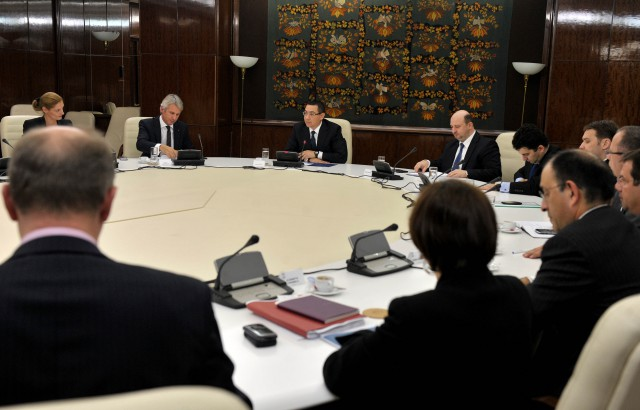Romania’s 10th loan agreement with the IMF
The evaluation of the 10th loan agreement in the last 23 years between Romania and the IMF has been postponed to the autumn, pending the drafting of next years budget.

România Internațional, 20.06.2014, 14:25
The delegation representing international lenders, which came to Bucharest early this month, made the decision after several snags appeared. One major point of contention is the Romanian authorities’ decision to reduce employers’ social security contributions by 5%. In September last year, the IMF board endorsed the letter of intent sent by the Romanian authorities for the signing of this new precautionary agreement worth around 2 billion Euros, valid for two years, with an additional 2 billion Euros provided by the European Commission.
This accord expires by the middle of next year, and, according to Romanian representatives, this stability loan is most likely the last one signed with the international lenders. At the same time, according to analysts, the delay in the evaluation of the current accord is no reason for concern. Economic analyst Aurelian Dochia explained:
Aurelian Dochia: “The lack of an agreement with the IMF raises questions regarding what kind of economic policies governments would adopt lacking the constraints usually imposed by the Fund. Our history of the last 20 years indicates that this poses certain risks, but in the end I believe that we should overcome the need for such agreements, and should stand on our own two feet.”
The moment is fairly favorable for Romania, as international markets have improved their outlook on the country lately, says Aurelian Dochia. In addition, the agreement is precautionary, and Bucharest claimed it would not access the money provided by international lenders under this agreement. The situation, however, may change if the international economy starts to give signs it is slumping again. Aurelian Dochia:
Aurelian Dochia: “Under certain conditions, this agreement may gain much more weight if the international markets are perturbed once more. For the time being things are relatively calm, and there are no reasons to worry.”
In any case, the present stand-by accord is still in effect, PM Victor Ponta emphasized:
Victor Ponta: “This accord doest not get interrupted, does not get dissolved in one way or another, it does not get rejected. We have this agreement, and this means that if we might need it, of course we don’t access the loans that are made available to Romania. We surely continue to have access to that 10% top up, as well as co-financing for European funds, with no impediment whatsoever. The credit lines opened by the World Bank for health and education programs are valid and functional. From this point of view as well, I believe that the confidence that Romania has earned in relation both to international financial institutions and private financial markets is an asset that we have to keep.”
The evolution of macroeconomic indicators was at the center of discussions in Bucharest, considering that budget revenues are below forecasts, and the government plans to introduce measures that would lower precisely these revenues. Among them is the above-mentioned 5% cut in employers’ social security contributions, postponed until October 1. Minister of Finance Ioana Petrescu says the measure will improve the business environment, and may even lead to job creation, as black market employment is reduced.
It is estimated that this measure will bring down budget revenues in the second quarter by over 2.5 billion lei, but the executive also expects a boost in the budget revenues by around 1 billion lei, both in additional economic growth and taxes associated with jobs that shift from the black market to the official market. The National Institute of Statistics, however, pointed out that Romanian exports dropped in the first four months of the year, after three years in which the country was top of the list across Europe. Imports are growing faster than exports, Mihai Ionescu, co-president of the Export Council, said:
Mihai Ionescu: “Exports are slowing down. In April we had the most sluggish growth rate in the last four years, which is a significant signal that should be taken into account. Three sectors are in freefall: metallurgy, the chemical industry and computer manufacture, while the best performing sectors continue to be car making, electronics, and the IT sector.”
International financial experts consider, however, that Romania continues to recover, and is expected to grow this year by 2.8%.






























